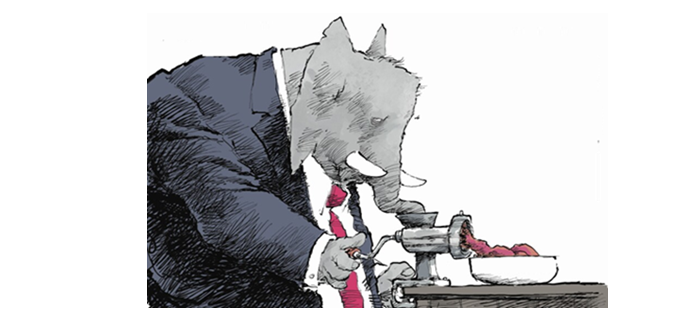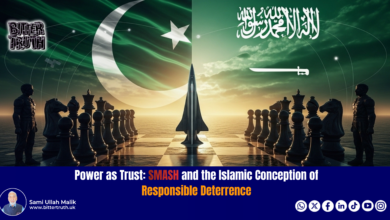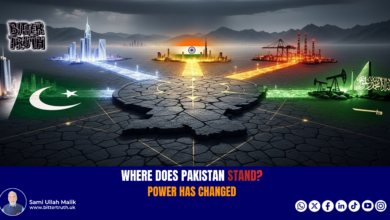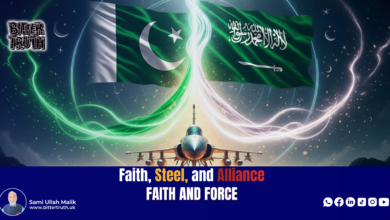The Persian Gulf and the rogue elephant
US President Jimmy Carter said during his State of the Union address in 1980 that if any foreign power intervened to take control of the Persian Gulf, the US would retaliate to protect the free flow of oil in the Middle East. will do Carter and his successors have always kept that promise. White House claims that the United States not only increased the capabilities of the American military in the region, but also participated in the Gulf War under the pretext of preventing Iraq’s Saddam Hussein from seizing the oil supply line. He was hanged. Although the United States had many other interests in the Persian Gulf, including pretexts such as preventing nuclear proliferation, counterterrorism, and promoting democracy, the most important interest of the United States was to continue the uninterrupted supply of oil while time and American narratives. proved that the US presence in the region is subject to its special interests in the world order.
America’s commitment to the Persian Gulf has never faced any major opposition. Even those who have been against America’s various alliances in Europe and Asia and termed these alliances as a burden on the country’s economy, have always agreed that America is responsible for the security of the Persian Gulf. You should keep your head, because one-third of the world.
A third of the oil production comes from this region, but now the world has undergone dramatic changes. During the Cold War, the greatest threat to American interests in the region was the Soviet Union. American policymakers worried that if the Soviet Union succeeded in cutting off oil supplies, the American military, dependent on oil and gas, would not be able to win a major war in Europe. Changed the nature of interest. Where both national security and prosperity depended on the security of the Persian Gulf, now it was only related to prosperity, which had a profound impact on US policy. The absence of a national security factor has increased military intervention in the Persian Gulf, as most Americans do not mind putting the military in trouble to defend economic interests. So here the question arises, is the Persian Gulf oil so valuable force. it should be defended by US military force.
To get the answer force’s question four more questions have to be answered. First, if the US ends its commitment to the Persian Gulf, how likely is it that there will be a major disruption to the flow of oil from the Persian Gulf? Second, how much of an impact will this disruption have on the US economy? Third, how much military spending does the US spend on protecting the flow of oil from the Persian Gulf? Finally, what are the non-military alternative means of protecting the Persian Gulf and how much will it cost? The answers to these questions testify that the costs of securing the Persian Gulf oil delivery system have reached a level equal to the benefits, and it is highly likely that these costs outweigh the benefits of this policy. Also, from benefits will increase. So, this is the time when the US should end its military engagement with the Persian Gulf and invest in alternative sources that can support the US economy in the event of an oil supply disruption. In a decade or so, when the region will be even more dangerous than it is today, the United States should be in a position to completely end its military involvement in the Persian Gulf.
Before properly evaluating the current policy, it is important to clear up a misconception. Politicians and analysts are often seen saying that to avoid the risk of a disruption in the oil delivery system, the US needs oil. Production will have to be increased so that dependence on imported oil is minimized i.e. independent in energy sector. This argument basically shows the misunderstanding of the global oil market system because autonomy in the trading of tradable commodities makes no sense. In fact, oil is bought and sold in the global market, so its price in the United States is linked to oil prices around the world. The example of the global oil market is like a tub of water, which has many taps for pouring water and many drains for draining it. Therefore, it does not matter how much water from each tap.
Water comes and how much water flows from a particular channel. In the oil market, which is dependent on supply and demand basis, oil supply is more important because if the oil supply drops sharply, all the consumers who get water from the wells will be affected. Therefore, even if the import of oil from the Persian Gulf of the United States becomes zero, even if the supply of oil from the Persian Gulf is affected, the United States will not be affected by the changes in oil prices.
It is possible to imagine how the oil supply could be affected if the US withdraws from the region, but none of these options seem viable. One possibility that can be considered is that if a Gulf country seizes most of the region’s oil reserves by seizing its neighbours, it may then try to control prices in the global oil market and so on. Any move would be tantamount to challenging the power of major oil consumers such as Britain and the US, but this option is by no means a possibility, as there is no country with such power in the region. Iraq has been devastated since the US invasion. It has been and still is in the grip of anarchy. Iran has been weakened by Western sanctions and its leaders are busy dealing with internal problems. Saudi Arabia, after getting rid of the war in Yemen, is no longer interested in conquering the region.
Another hypothetical scenario that can be considered is that an indirect war for control of the region could plunge the Gulf countries into chaos and anarchy and destroy basic infrastructure. Which may affect the supply of oil by ships, but there are many factors that prevent this hypothetical situation from becoming a reality. There is no state in the region that would risk such a big war to establish its monopoly. A country may try to occupy another country, but this is also not an easy task. Iran and Saudi Arabia could have targeted each other, but where they are separated by the Persian Gulf, China has done so. He has played a very positive role in establishing peace in this region.
Iraq is relatively insecure due to internal divisions and its border with Iran, but Iran itself faces numerous challenges and is likely to face many more challenges than it would in the event of a U.S. invasion of Iraq. In addition, the basic infrastructure of oil reserves is able to function even during intense war, a clear example of which is the Iran-Iraq war of 1980, when even during the intense war, the oil supply was less necessary but continued and the war continued. Oil prices stabilized again shortly after the shutdown.
A third possible scenario could be that Iran disrupts the supply of oil through the Strait of Hormuz to embarrass the US and its allies. The Strait of Hormuz has a very narrow 21-mile passage through which 20 million barrels of oil pass daily, which is about 20 percent of global production. They can certainly disrupt supply by laying mines and using missile boats. But nothing can be said about whether Iran intends to close the Strait of Hormuz or not. However, closing the supply line will also affect its own production and imports, and neighbouring countries will also react strongly. . In fact, Iran has never attempted to do so, not even during the Iraq War.
There is no doubt that if the United States ends its commitment from the region, then Iran might even start considering this option. If he violates it, in response to the sanctions imposed by the West, he should try to block the Strait of Hormuz, which is not easy to do, but if the United States refuses to undertake the protection of the Persian Gulf, it will The possibility of the reality of the situation will increase, but this situation changed completely when Trump himself violated the agreement with Iran and withdrew from it, and more international efforts were made to punish Iran. After the implementation of the sanctions, Iran has made several assurances by talking to the rest of the members of the agreement on an emergency basis. has ordered the relevant authorities to speed up their preparations for enrichment. Therefore, the United Nations Atomic Energy Organization (IAEA) has been informed about increasing the capacity of uranium enrichment. Iran’s nuclear agency has announced it will make more of uranium hexafluoride, the most important enrichment component. If we were to do business as usual, it would probably take six to seven years, but now it will be ready in the coming weeks or months. If Iran is to be believed, Iran has achieved its goal so far.
The last possible threat to disrupt the oil supply line after the US misbehaviour is that the internal conditions of a major oil producing country deteriorate to the extent that oil production is affected. Not only does Saudi Arabia produce more than 10 percent of the world’s oil, but it has such large oil reserves that it is capable of affecting oil supply lines around the world. For now, its exports seem safe. The Saudi army is responsible for protecting the oil reserves and they are doing a good job. Therefore, any kind of terrorist act will probably fail even though these days the Saudi Kingdom has overcome its difficulties by separating from the war in Yemen, in which China has played an important role.
The Saudi royal family is generally considered entitled to the monarchy. Most of the people of the country are benefiting from the oil wealth, and due to the tireless work and military skills of General Raheel and his colleagues, the Saudi army has become much more skilled than before. These are all the reasons that has timely saved Saudi Arabia from the effects of the Arab Spring. Moreover, in the event of a civil war, if a new power takes over, it will also have to continue oil production as the country’s economy is entirely dependent on oil production. Even if the U.S. ends its commitment to the Gulf, it can continue to train Saudi Arabia’s military for internal security, as well as continue to share intelligence and supply weapons. In short, if the United States decides to end its military commitment from the region, there will be an increase in the possibility of oil supply being affected, especially from the Strait of Hormuz, but this increase will be very small. How expensive could such a barrier be? And it could also become a prelude to a possible major war in the region.
The predictions of experts about the losses due to any interruption in oil supply are quite alarming. According to recent data, a one percent reduction in global oil production will increase global oil prices by up to 8 percent. To put these figures in front, if one hundred thousand barrels of oil per day were to be cut short due to any disruption, it means that Saudi exports would be zero or the supply of oil from the Strait of Hormuz would be reduced by 60%. If so, world oil prices will double. The world has yet to face any such disruption, but if it does, the damage is difficult to predict, and the price could rise even further. Oil prices will also have a profound impact on the US economy. According to a conservative estimate, if the price of oil doubles, the gross domestic product of the United States will decrease by three percent, which is about 550 billion dollars, and in the case of a major disruption, such as the complete loss of oil supplies from the Strait of Hormuz. If closed, then its losses will be equally dangerous.
But its real impact on America will be very less because in such a case America can use its emergency reserve of petrol. Also to control prices It can also use underground reserves. According to an estimate, there are 700 million barrels of oil in the Strategic Petroleum Reserve. In addition, more than four billion barrels of oil are in the International Energy Agency.
Member States also have it. This organization was established in 1974, the purpose of which was to fight the global oil crisis together. If the supply of oil from the Strait of Hormuz is stopped even for a long period of eight months, this four billion barrels of oil can cover this shortfall for eight months. In the event of such a crisis, the United States will have 44 million per day from its safe reserves for the first month. Barrels of oil will be extracted, and the member countries of the International Energy Agency can also extract 85 million barrels of oil per day from their reserves. China, which is not a member of the International Energy Agency, can also use its reserves. All these figures testify that in the event of a major interruption in the supply of oil from the Persian Gulf, if the world adopts a mutual plan of action, it can recover the daily losses.
In order to evaluate the economic advantages and disadvantages of the presence of the US military in the Persian Gulf, it is necessary to evaluate the costs of its presence there. There are huge costs involved in keeping US warships active. Since the end of the Cold War, the Pentagon has pursued a strategy of dealing with two enemies at once, always considering one enemy in the Persian Gulf. is planned. The strategy of fighting on two fronts was adopted so that there would never be a chance that the US would be so stuck on one front that opportunists would take advantage by attacking the other front. If he does, he is left with two options, one is to continue with the strategy of fighting two enemies at a time but that other enemy is in another region, the other is to adopt a strategy of fighting one battle at a time. But in this strategy, there is no region more dangerous than the Persian Gulf where presence can be maintained under this strategy.
It is difficult to accurately estimate the cost of the US military in the Persian Gulf, as the troops there are being used elsewhere. According to experts, if the US adopts a war strategy, it will save an estimated 75 billion dollars annually, which is 15% of the defence budget. This money can be saved by reducing the number of troops, reducing the number of warships and reducing the number of weapons, but the US commitment to the Gulf is not limited to reducing the number of troops. In this region, America has fought many wars directly or indirectly to protect its interests regarding oil, for which it has paid a heavy price. When the US participated in the Gulf War, the main objective was to continue the supply of oil. Although according to the American statement, the Iraq war was not fought for oil, but time has proved that it was only to deceive the world and the main reason for the desire of the policy makers for stability and democracy in Iraq was the oil reserves there. Therefore, as a result of ending the relationship with the Gulf, not only dollars will be saved, but the loss of precious lives will also stop because now the countries of the region have understood the American deception.
At the end of all this discussion, the question arises that what can be the alternative of using the army to protect the oil coming out of the Persian Gulf? If the use of the military had been the better option to deal with the disruption of oil supply, the defenders of this policy would be in a better position today.
In fact, the US can use many non-military means to ensure the security of this supply. On the one hand, the US can increase its strategic oil reserves. For example, strategically, if the US increases its petroleum reserves by 50%, it can meet global demand for a few more months in the event of a major disruption in oil supply. And for this work he will have to spend ten to forty billion dollars which he can receive from the affected countries.
If we look at the demand for gasoline from the American and European countries, most of them are busy looking for a substitute for gasoline since the day when the late Shah Faisal announced to stop the sale of gasoline to the United States and its allies. After which there was an uproar in the world. After that day, under a special strategy, steps were taken to reduce the share of oil in the American economy, but they have not yet found a complete substitute for gasoline, but at the same time, the United States and Europe have implemented such policies. What is certain is that the economy is not affected by changing oil prices. The transportation sector in the US consumes 70% of oil, so there is a growing trend to focus on this sector. All the presidents from George Bush to Obama paid special attention to this issue, but Trump’s actions have not only brought the region but the world to the brink of destruction, but defence and economic experts have avoided aggressive policies to avoid these threats. He also warned Trump that to avoid possible dangers, the United States and its allies must take measures to reduce oil consumption on an emergency basis. For this, the tax rate on gasoline will have to be increased. So that the people increase the use of alternative means, but Trump did not pay attention to this, which is also the cause of his difficulties so far.
According to American experts, there are some development expenditures that give results after a long time, such as the research sector. A reduction of up to fifty percent will be possible. Therefore, if the government spends 100 to 200 billion dollars in the next 15 years on sectors such as research, which is about ten billion dollars annually, then the 75 coming on the defence of the Persian Gulf. Billions of dollars in annual costs can be avoided.
In addition, the United States can take various measures to reduce the impact on the economy of any interruption in oil supply. Pressure should be placed on our western allies to increase their reserves substantially, because if they do not do so, in addition to the increase in the SPR, the United States will have to bear the burden alone in the event of a crisis in the IEA. will have. At the same time, Washington will have to increase pressure on the Gulf countries to reduce their dependence on the Strait of Hormuz and increase the capacity of the oil pipeline that passes through the Strait of Hormuz, which they can easily do.
After evaluating the advantages and disadvantages of the presence of the US military in the Persian Gulf, it can be concluded that the current strategy is not entirely wrong. Often, we have to spend heavily to deal with lesser risks, but now wisdom demands that this commitment should end. National Security in the context of the situation, there is no fear of any major loss due to the disruption from the Persian Gulf. Economically, the country can withstand any disruption in the supply of oil and will be less dependent on this oil in the future. Will be. In the current situation, instead of its presence in the Persian Gulf, America will have to gradually bring itself to a position where it can end this commitment at any time. In the coming two decades, more investments will be needed to achieve self-reliance in terms of oil, such as increasing domestic reserves, better energy use and increasing the efficiency of oil pipelines passing through the Strait of Hormuz. The country will soon become self-reliant.
On the other hand, the Pentagon had convinced Trump that after self-sufficiency in oil, the United States would have to maintain its commitment in the Gulf by keeping the threats there in front. The most prominent among these threats is Iran, for which the associated threats will continue to decrease after more stringent conditions are imposed on Iran in the nuclear deal. After lifting the ban on oil imports, Iran will hardly ever think of a disturbance in the Persian Gulf, because doing so would mean losing a lot of revenue. Achieving self-sufficiency in oil should relieve it of the responsibility of protecting the oil supply line, but if Iran goes on the offensive, then the US may face a difficult situation.
These days, there is a growing feeling among the American people themselves that the United States should end its military involvement in the Gulf as soon as possible, which will significantly reduce its costs and change priorities, and if the United States withdraws its military If the commitment remains, it will have to spend a large portion of its defence budget on it. However, this decision is now connected with the current situation in Gaza, what will be the US military priorities in the Persian Gulf, among which nuclear proliferation is the most important. What is surprising is that decision makers have never questioned the military presence in the Gulf for decades, even though the need for a military presence in the Gulf has never been the same. Not revisiting the issue and investing in alternatives. It is a big mistake to do. As a result of this mistake, while the US is losing billions of dollars, its army is also involved in an unnecessary war. If the evil elephant like Israel is not rescued soon, then this white elephant itself will start crushing America under its feet.
Friday 2nd February 2024
Lahore Pakistan






